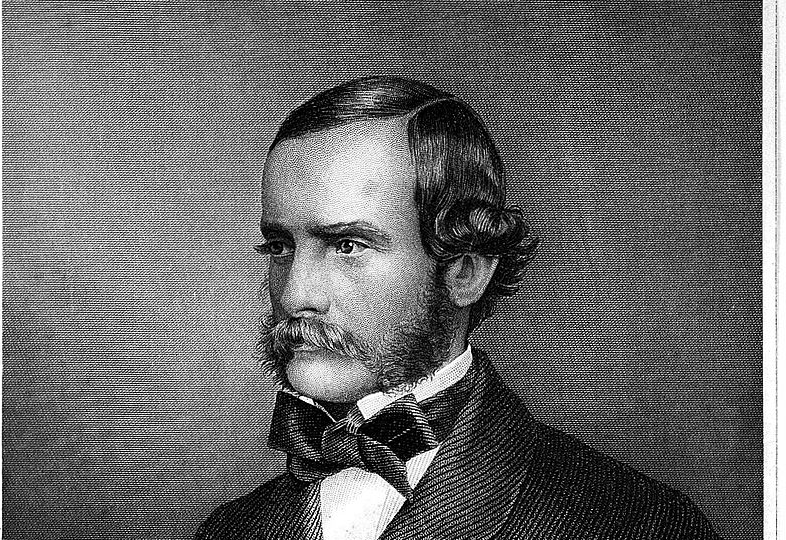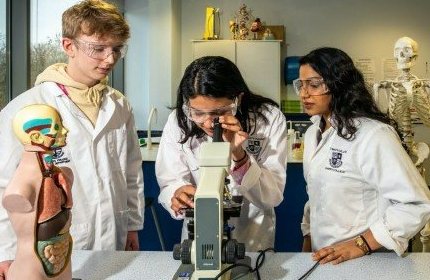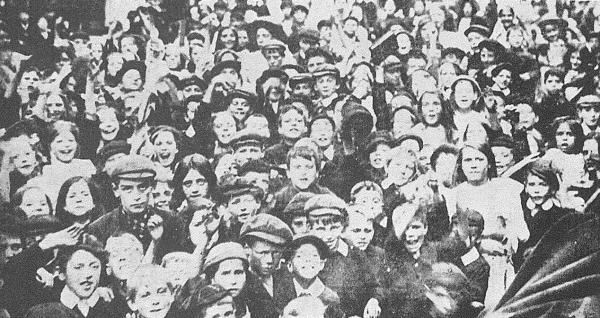Edward Francis Collins, born in Drogheda, Ireland on 19th October 1807, came to England to study for the bar and became the assistant of Joseph Hume, the Radical advocate of the Great Reform Bill (1832). By 1841, Collins was the Editor of the Hull Advertiser and up to his resignation in 1866 built a reputation as one of the most prominent radical voices of the local press nationally and a thorn in the side of the status quo when it did not meet his exacting standards.
This was a time when many local papers syndicated their Leader columns. In one of his earliest leaders Collins, in December 1846, was prescient: “if only our Cabinet Ministers would be as liberal and expeditious in feeding the Irish as in shooting the Afghans.” As “that proverbial hunger that breaks through walls” ravaged his homeland, he toured the country during the Irish Famine and sent back reports for the Hull Advertiser. During the Crimean War (1853-6) his Leaders were critical of the Government and used data from Florence Nightingale and accounts from the Sisters of Mercy who served alongside her to lambast the fact that more men died from disease than were killed in action.
Collins was a campaigning journalist and an activist in support of Radical causes. An advocate of free trade, he fought for the control of the Hull workhouse by the poor-law board, and supported the drainage scheme recommended by the General Board of Health. He pushed hard for the very poor, many of whom were immigrant Irish cotton spinners. In a Report he published in 1849 he lambasted local landlords whilst making it plain that the “working classes spent the majority of their income on alcohol, drugs and gambling rather than spending their money on improving their own environment”. He was an enthusiastic advocate of the Temperance Movement.
He campaigned for religious toleration for Jews and Catholics. Throughout the 19th century, the Irish were ridiculed in the press and public opinion could be hostile. In Hull, the local Irish community included McManus, Chief of Police, Dr Owen Daly of the HMS and Collins – all were focussed on Public Health and Law and Order. Added to this, the Sisters of Mercy built schools before chapels to educate young girls as well as boys in the poorer districts. Irish assimilation in Hull was remarked upon.
Collins would not allow sectarian prejudice to intrude on his Public Health drive. “We cannot but regret,”, he wrote in 1851, “that, whilst so many of the clergy of Hull take great trouble to innoculate the minds of the people with uncharitable and ignorant prejudice against the imaginary danger of Popery not one of them has come forward to organise a movement against the prevention of sickness by the frequent use of excellent Public Baths.” Madley Street, Beverley Road and Albert Avenue came later but seeds were sown.
The “Lowgate Philosopher” was controversial. The Bellman, a satirical paper, lampooned the Hull Advertiser as an “unEnglish, unclean and most intolerable results of the Irish Craze – a Sepoy Journal”. Collins himself was styled as “this oleaginous incubus, this amorphous being born like an Arctic jelly fish of oozy exudation and hyperborean fog, this pulpy, plethoric, imposthumation … looks upon us all in his blubbery beatitude ... occasionally coming up to blow from the slimy depths and miry beds where mud fish repose in the unmolested obscurity and twilight of effete superstition.” When he left Hull, an Orange Order band came over to celebrate his departure.
Collins was a strong ally of the Hull Medical Society and their Report on the Cholera (1849) was published by the Hull Advertiser. Together, these activists moved the agenda urging the Council to improve the physical structure of the area through surfacing roads, laying drains, lighting streets and ensuring new housing had adequate drainage. They were strong on controlling or removing potential causes of disease: emptying privies, refuse collection, the regulation of offensive trades and dairies as well as collecting statistics on deaths due to infectious diseases.
They were pro-active, promoting good health with the establishment of burial grounds away from the crowded city centre and, the promotion of parks for fresh air and recreation for slum dwellers. Collins polarised opinion being seen as “a political harlequin and donnybrook litterateur”. Edward Francis Collins moved back to London in 1866 where he died in obscurity in 1872 and is buried at Kensal Green.
That “famed producer of mental claret” had been a pivotal advocate of what would now be called social justice causes across Hull. His work supported the HMS and is another illustration of how these activists did so much to lay the framework for the City we know today – sanitation, public parks, greenery and the use of statistical evidence to support Policy. Edward Francis Collins was a Hullensian from elsewhere to be proud of; his contribution worthy of a plaque.










